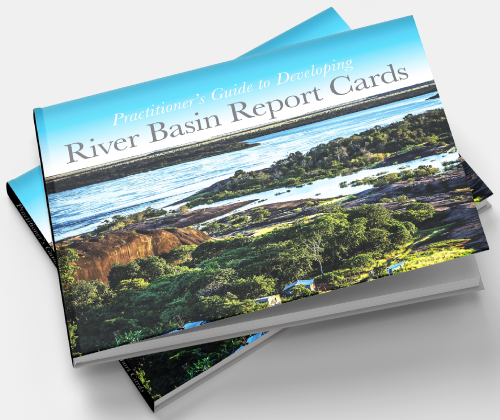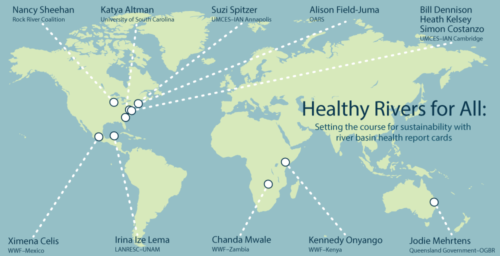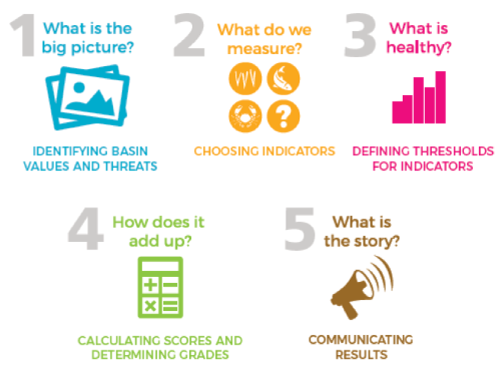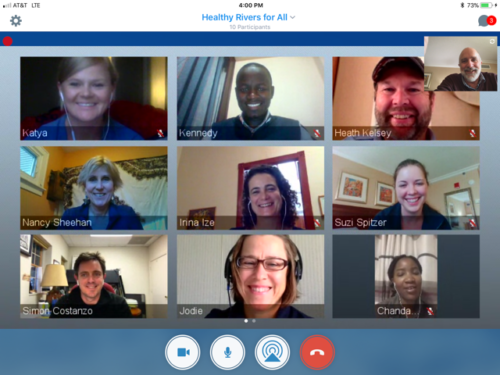Reflections on teaching a global course on developing environmental report cards
Bill Dennison ·We recently completed our course entitled: "Healthy Rivers for All: Setting the course for sustainability with river basin health report cards". The course was co-taught by Heath Kelsey, Simon Costanzo and me, supported by Suzi Spitzer, our excellent teaching assistant. We used our recently completed book, "Practitioner's Guide to Developing River Basin Health Report Cards," as the textbook.

We also employed a 'flipped classroom' where the lectures were delivered as YouTube videos prior to class and students rotated as discussion facilitators and rapporteurs/blog authors. Since we had relatively advanced 'students,' they were able to keep a really lively discussion going and they produced excellent summary blogs. The course blogs were the following:
1) 'Don't let the perfect be the enemy of the good: Taking the first steps toward developing a basin report card' by Nancy Sheehan, posted on 15 Nov 2017.
2) 'What's the story in your report card?' by Jodie Mehrtens, posted on 22 Nov 2017.
3) 'Defining report card indicator thresholds to achieve healthy outcomes' by Katya Altman, posted on 6 Dec 2017.
4) 'Grading basin or ecosystem health to track and address change' by Irina Ize, posted on 13 Dec 2017.
5) 'Telling the river story' by Kennedy Onyango, posted on 20 Dec 2107.
6) 'Medulla of the report card success: Project management and workshop' by Katya Altman, posted on 10 Jan 2018.
7) 'Now what? Life after the launch of a report card' by Chanda Mwale, posted on 17 Jan 2018.
8) 'When to go big with report cards' by Jodie Mehrtens, posted on 24 Jan 2018.
9) 'Last but not least . . . now that you know, it's time to work!' by Ximena Celis, posted on 31 Jan 2018.
The most amazing thing about the course was the assemblage of students. They were from five different countries from North America, Africa and Australia. The students were resource managers and practitioners representing a variety of non-government organizations (NGOs), universities, and government agencies. They provided a lot of insights and experience in their respective ecosystems, which came out in their introductory environmental literacy presentations, during class time discussions, and in their final presentations. It was a pleasure to learn about their interesting ecosystems.

The students in the course also were in very different places in the report card journey - some were just starting to think about the idea, while others were getting ready to publish the first ones, and one was even working to integrate established report cards from different organizations. This diversity of report card experiences meant that there were lots of opportunities for students to learn from each other's experiences and share what they had learned.

One of the biggest challenges of this course was the simultaneous class time discussions across such a wide diversity of time zones. We chose our class time based on the assemblage of students' time zones. We started teaching the course from 3-5 pm Eastern Daylight Time, which meant that our African students Kennedy Onyango and Chanda Mwale logged on from 10 pm-midnight their local time and our Australian student Jodie Mehrtens logged on from 5 - 7 am her local time. When daylight savings ended in Maryland, we had to switch to 2 - 4 pm Eastern Standard Time because the Africans were at their late night limit and the Australian was up as early as desired. I was impressed at everyone's ability to be as engaged as they were in spite of the crazy local times.

In our final summary discussion, all of the participants expressed a desire to check back in and share their report card experiences. We feel as though we are developing a 'Community of Practice' by those of us actively engaged in producing report cards. The diversity of examples provided insights into different ways to approach report cards. We are planning to meet again in about six months and I look forward to hearing about their progress.
For our final class time discussion, I provided the following poem:
Healthy Rivers for All Class
25 Jan 2018
William C. Dennison
Healthy Rivers for All was a brand new class
And we taught it in a brand new way,
Logging onto BlueJeans from all over the globe
Playing the time zone game,
With Kennedy and Chandra staying up late
And Jodie and sometimes Simon getting up early.
We shared our stories from many different countries
Capturing lessons learned from diverse locations.
We had some great instructors, but the TA was the best
Miss Suzi kept us organized and on track throughout.
We had participants from Africa, Mexico, Australia, and the U.S.
Some of us had snow out the window, some had blistering heat,
But we were all united by Healthy Rivers for All.
I looked forward to class each week.
I loved the environmental literacies.
I loved the course videos.
I loved the insightful blogs.
And now I have learned to love the Kafue River in Zambia,
the Copilita River in Mexico, the Rock River in Wisconsin, the Mara River in Kenya, the Concord River in Massachusetts, Surfside Beach in South Carolina,
And the coast of Queensland, Australia, and the coast of Yucatan, Mexico.
I hope one day to personally visit these amazing places
Because I would love to meet the Healthy Rivers for All crew in person.
About the author
Bill Dennison

Dr. Bill Dennison is a Professor of Marine Science and Interim President at the University of Maryland Center for Environmental Science (UMCES).
Next Post > A Long Love Affair with The Chesapeake Bay Part II
Comments
-
Irina 6 years ago
Great instructors too! Thank you for your blog, Bill, and thank you for such a nice poem! Best to all.
-
Nancy Sheehan 6 years ago
The passion and knowledge of the instructors, Bill, Heath, and Simon, and the teaching assistant, Susie, was evident in every one of our course sessions. I appreciated learning about the successes and challenges faced by other participants in this course. I too look forward to hearing from participants in the months ahead. I hope to grow a local "Community of Practice" right here in southern Wisconsin. Thanks for creating a forum for sharing ideas. United for healthy watersheds!
-
Chanda 6 years ago
Thanks for a lovely blog and poem Bill! Indeed a community of practice was built and it would be great to touch base with each other from time to time. It was a lovely class with many lessons learnt and shared. It wouldn't have been so great without excellent instructors and Ms. Suzi keeping up on track. Thank you Healthy Rivers for All Class of '17/'18!
-
Atika 8 months ago
I appreciated learning about the successes and challenges faced by other participants in this course. I too look forward to hearing from participants in the months ahead. I hope to grow a local "Community of Practice" right here in southern Wisconsin. Thanks for creating a forum for sharing ideas. United for healthy watersheds!